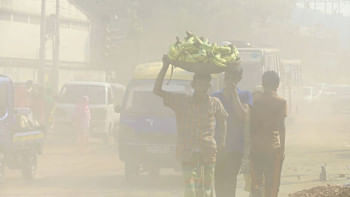Rayhan Kabir’s arrest and the systemic exploitation of migrant workers in Malaysia

As early as March 2020, Human Rights Watch warned that migrants and stateless people are more at risk of virus transmission in Malaysia, and that Malaysia needs to ensure health care for all without discrimination. In the eastern state of Sabah—home to a large population of irregular migrants, stateless people, and holders of various refugee passes who tend to live in small, crowded houses with inadequate sanitation and serious barriers to access to healthcare—the police commissioner asked all foreigners to come forward for coronavirus testing, saying, "Don't be afraid because the police will not arrest them... the most important thing is the health screening and if they are found to be healthy, then they will be allowed to go home." This same assurance was also repeated by the Malaysian national authorities.
The arrest and imminent deportation of Bangladeshi student-turned-migrant worker Mohamed Rayhan Kabir—because he dared to criticise the Malaysian government's policies towards migrant workers in a documentary by Al Jazeera—expose just how hollow those words were. Since the outbreak of the pandemic, undocumented migrant workers and refugees have been rounded up in a military-style crackdown and detained in camps under the pretext of safety measures and quarantine. Rights groups have criticised Malaysia's indiscriminate and heavy-handed approach that has ignored the rights of workers, put migrant workers at greater risk of infection in crowded detention facilities, and deterred others from seeking testing and treatment out of fear of deportation.
In the Al Jazeera documentary, a Pakistani man described how, despite being a documented worker, his family (including his children) were handcuffed and chained together under the hot sun for hours, and were only released after their documents were verified. In his interview, Rayhan also referred to the same atmosphere of fear, saying the illegal detentions were "a clear act of racism and clear act of humiliating people. I feel scared of the future of migrants."
Rayhan's words clearly hit a little too close to home—Malaysia's track record with migrant workers is hardly one to be proud of. As early as 1998, links between state officials and the "immigration industry" had been found, where syndicates were supplying false documents to illegal migrants, according to a paper by the Yusof Ishak Institute. The report also detailed how the 1997-1998 Malaysian economic crisis led to the festering of anti-immigration sentiments and nation-wide crackdowns on undocumented migrants, culminating in clashes that left eight migrants and one policeman dead in a detention camp in Kuala Lumpur on April 26, 1998. More than two decades later, the situation seems to have hardly changed. A senior Malay journalist recently spoke to The Wire about the collusion between law enforcement agencies and companies hiring undocumented migrant workers who are at the mercy of human traffickers and loan sharks, and how the pandemic-induced economic downturn has influenced the Malaysian authorities to take a more populist, anti-immigration stance.
The general feeling of ill-will towards migrant workers is also reflected in the Al Jazeera documentary, where an employer in a marketplace speaks of how South Asian migrants are "culturally" different and do not follow the same standards of cleanliness as Malaysians, even while admitting that these low-skilled workers are recruited because they are most likely to do labour-intensive work for long hours. However, the country's race issues are nothing new. Malaysian columnist Sade Dayangku echoed Rayhan's words on racism, writing "Not only are they treated like lesser humans by employers, but our society looks down upon them too, calling them 'dirty' or 'smelly', whether it's because of their darker skin or the perceived 'lowly' jobs that they do."
This racial discrimination is an add-on to the existing poverty and exploitation faced by migrant workers. A 2015 World Bank study showed that while Bangladeshi migrants pay the largest sum of money for recruitment, they receive the lowest wages and are most likely to be struggling with debt. In September 2019, the Malaysiakini reported how Bangladeshi migrant workers were allegedly being traded between firms in slave-like conditions that violated Malaysian labour laws; another report found that 96 Bangladeshis had died in Malaysia in January 2019 alone, with the Migrant Workers Right to Redress Coalition (MWR2R) raising questions about poor living conditions and barriers to seeking healthcare.
In this scenario, how do we provide adequate protection to our migrant workers? The Expatriates' Welfare and Overseas Employment Minister Imran Ahmed's recent comments to BBC Bangla—"We have a responsibility towards Rayhan but also towards the country; we have to think of the thousands of other Bangladeshi workers in Malaysia"—demonstrates the precarious situation our workers are in. There are some eight lakh Bangladeshi migrant workers in Malaysia, of whom an estimated two lakh are undocumented. In September 2018, Malaysia stopped recruiting workers from Bangladesh following allegations of malpractices in the recruitment process and high recruitment costs. While the two countries were engaged in talks to resume the hiring of Bangladeshi workers, the resignation of Prime Minister Mahathir Mohamad led to the cancellation of the fourth joint working group meeting due in February this year. After the onset of the pandemic, Malaysia then announced that no foreign workers would be recruited for at least the remainder of this year.
As a result, the talks being held last month between Dhaka and Kuala Lumpur on regularising the huge number of undocumented Bangladeshi workers in Malaysia (thus saving them from deportation) are a welcome prospect for Bangladesh, and our authorities are in no rush to jeopardise these discussions. However, the heavy-handed approach that Malaysia has taken to Rayhan's "dissent"—arresting him and planning his deportation, revoking his perfectly valid work permit, and putting him at risk in an environment that is already hostile to immigrants—can hardly be ignored either. We must also remember that a majority of Bangladeshi workers in Malaysia are in low-wage, precarious employment that cannot be considered to be "decent work" according to ILO standards, and given the desperate conditions they are being faced with during the pandemic (this daily reported in April how a huge number of Bangladeshi workers in Malaysia were facing acute food shortages), they are likely to become even more vulnerable to exploitation.
In the wake of the coronavirus pandemic, the exploitation of migrant workers across the world has received renewed attention, and it has become clear that Bangladeshi migrant workers specifically are at a great disadvantage in their host countries. We must work with other countries and regional bodies, and fight for our workers on international platforms to ensure that their rights are not routinely ignored. Additionally, the governments of both Bangladesh and Malaysia must take steps to dismantle the lucrative industry that has mushroomed around the recruitment and management of migrant labour, creating a network of syndicates who prey on vulnerable workers, and deal with the rampant corruption that is so often linked to labour migration in both countries. Given that Malaysia relies heavily on migrant labour for low-skilled jobs—according to the ILO, around 20 percent of the country's labour force is made up of documented migrants—and that the Malaysian economy is expected to still require this labour force in the post-pandemic era, now is the time for us to raise our voices and stand by Bangladeshi migrant workers when they need us the most.
Shuprova Tasneem is a member of the editorial team at The Daily Star.
Her Twitter handle is @ShuprovaTasneem.

 For all latest news, follow The Daily Star's Google News channel.
For all latest news, follow The Daily Star's Google News channel. 



Comments